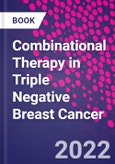Combinational Therapy in Triple Negative Breast Cancer discusses TNBC at the molecular level from a holistic approach, focusing on combinational strategies targeting various pathways involved in this specific cancer type. Using a monotherapy for the treatment of cancer, especially high-grade tumors like TNBC, is mostly worthless due to the inherent genetic instability of tumor cells to develop intrinsic and acquired resistance. Combination therapy presents more, or at least the same, effectiveness with lower doses of every single agent and decreases the likelihood of chemoresistance, making it essential to understand for multiple therapy options.
The book is a valuable resource for cancer researchers, oncologists, graduate students and members of the biomedical field who are interested in the potential of combinational therapies to treat triple negative breast cancer.
Please Note: This is an On Demand product, delivery may take up to 11 working days after payment has been received.
Table of Contents
1. TNBC: an aggressive subtype of breast cancer2. Novel Biomarkers and Genetics: Role and Perspective3. Current Therapeutics and Treatment: Significance and controversies4. Conventional Adjuvant Chemotherapy in combination with Surgery, Radiotherapy and other non-specific agents5. Role of Immune system in Oncometastasis: A New Perspective6. What if immunotherapy is used in combination with the chemotherapy?7. Will there be any improvement if chemotherapy is combined with target specific biological agents?8. Different drug delivery Approaches in combinational Therapy








